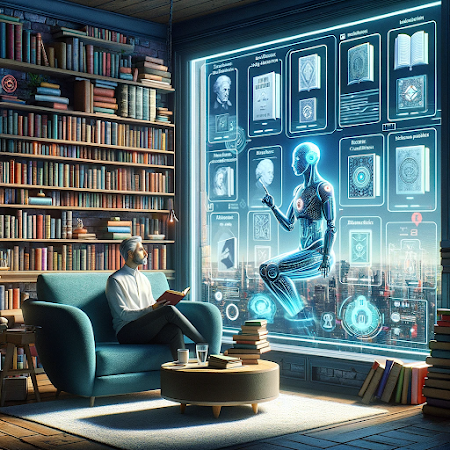Beyond Reading: AI Transforming Access to Literary Knowledge
Envision a future where the boundary between artificial intelligence and literature becomes permeable. With recent advancements in customizable OpenAI GPTs, we are already witnessing the beginning of this revolution. But what if we could go a step further? Imagine a plugin that enables direct integration of GPT with your Kindle library. Although this technology does not yet exist, the possibilities it opens are vast and thrilling.
Public domain works by philosophers like Plato are already accessible for integration with these AI models. However, many modern analyses and translations are copyrighted. A plugin connecting GPT to your Kindle library would offer direct and legal access to these materials. This not only respects copyright laws but also enriches the educational experience, allowing AI to analyze and discuss these contemporary interpretations.
Imagine the convenience of asking your customized GPT to analyze a specific concept in a work by Plato, and it having direct access to the relevant version in your Kindle library. This would create a personalized and dynamic learning experience, where each user has a virtual study assistant tailored to their book collection.
This technology would not be limited to philosophy. It could be applied to any field of knowledge: literature, science, history. Teachers could use customized GPTs to create interactive lessons based on course texts. Students could have deep discussions with an AI that understands their course materials.
Interacting with a GPT that understands and references the books you own opens up new ways of learning. You could have in-depth discussions about a recently read book, with the GPT bringing insights and connections from your Kindle library. This would transform how we interact with books and learn, making the experience more interactive and enriching.
Although integrating GPT with the Kindle library is still just an idea, it highlights innovative paths AI technology can take. Future developments in this area could significantly transform how we access and interact with knowledge. This opens an important dialogue about the technical and ethical challenges accompanying such innovations, particularly regarding data privacy and security.
Besides integration with the Kindle library, imagine if the plugin could access book reviews from sites like Goodreads.com. When studying Plato, for example, the GPT could analyze indices and metadata from the Amazon library, identifying complementary works or those offering divergent perspectives. This would not only deepen your understanding but also enrich the debate.
A particularly interesting aspect is the potential for monetization. If the plugin suggests purchasing additional books, it could generate a sales commission for the plugin owner, paid by Amazon. This business model not only encourages the creation of more sophisticated and useful plugins but also opens a new path for monetizing digital content.
While the possibilities of customized GPTs are vast, it's important to recognize their current limitations. One such limitation is the ability to add only 14 PDFs. This significantly restricts the scope of research and analysis, especially when dealing with complex themes requiring a wide range of materials.
Moreover, current GPTs face challenges in performing detailed quantitative analyses. For instance, when inputting the four volumes of "The History of Western Philosophy" by Otto Maria Carpeaux in PDF format, the current system struggles to quantify and list specific elements, like the number of Roman emperors mentioned. This is due to inherent technical limitations of the model.
These limitations highlight the need for continuous advancements in AI technology. As we celebrate the progress already made, we must also keep a critical eye on areas that still require development and refinement. The future of customized GPTs depends not only on technological innovations but also on a clear understanding of their current capabilities and limitations.
This type of integration creates an interconnected knowledge ecosystem, where learning, review, and acquisition of new materials merge. This transforms the way we consume literature and knowledge, making the learning process more dynamic and personalized.
As we explore these futuristic possibilities, we encounter a horizon where AI, digital reading, and data analysis converge to create an unprecedented learning experience. Imagine a world where technology not only complements but also enhances our ability to learn and explore new ideas.
I invite you to dream with me about this future, where artificial intelligence is not just a tool, but a partner in our journey of learning and discovery. A world where the boundaries of knowledge are expanded by the fusion of AI with our personal digital resources.
Credit: DALL·E 3 A futuristic concept illustration depicting the integration of artificial intelligence and literature. The scene shows a person sitting in a modern, cozy reading nook with large digital screens displaying various classic and contemporary book covers. The person is interacting with a holographic AI assistant, represented as a semi-transparent figure, which is analyzing and discussing the books from the reader's Kindle library. The environment is filled with books, both physical and digital, and the holographic AI is pointing towards specific books, suggesting deep connections and insights. The room has a window showing a futuristic cityscape outside, indicating the advancement of technology in everyday life. The illustration conveys a sense of wonder, learning, and the vast potential of AI in enriching literary knowledge. The person is a middle-aged Caucasian male, dressed in casual attire, deeply engaged in conversation with the AI assistant.




Comments
Post a Comment